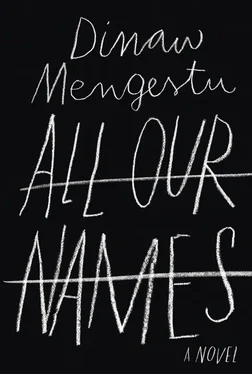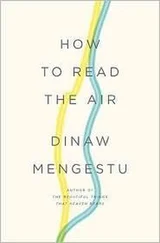“I asked my father why the black people didn’t leave. He said maybe they didn’t believe anything would change, or maybe they were waiting for the world to change around them and they wanted to be home when it did. It was the most eloquent thing he had ever said to me, and I knew he must have asked that same question himself and that was the best answer he could come up with. I would say both reasons are equally true.
“There’s a spare bedroom upstairs. Why don’t you get some sleep before you decide who to visit next?”
“And what if someone found out I had slept in the home of two different men in one day?”
“Will I see you at work on Monday?”
I didn’t have a plan yet, but I felt certain that was unlikely.
“I don’t know. But I hope not.”
We drove west for several hours before cutting north onto a trail of dirt roads that wound their way through empty green hills and the nameless hamlets that sat at their feet. The sun had begun to set by then, and from the back of the truck I watched as the hills caught all the colors that came with that. It was a beautiful sight, even more so because I was the only one deliberately noticing it. I was in the war, but I no longer belonged to it. I stood and at times sat among a dozen other men who rarely looked at me, even as we were constantly thrown against one another with every rock and bump in the road. I took out the notebook Isaac had given me and tried to think of something to write, but then thought better of it when I saw I was being watched. I drew a crude picture of the hills instead, so I could remember them.
When our convoy stopped at the checkpoint leading into the village, the soldiers leapt out the back of the truck and took their positions around the sides. The ones in the truck in front of us did the same, leaving me alone to watch as the horizon turned a deep orange more striking than the purple and red shades that had preceded it. From that slightly elevated perch I could see the tips of all the thatch-roofed huts in the village — hundreds of them, lined up neatly on either side of the main road, and every one looked as if it were burning.
Joseph and those closest to him, including Isaac, were the last to leave their cars. They filed out of the two sedans, dressed in identical button-down olive-green uniforms. It was also an impressive sight, no less remarkable than the sunset ending right in front of us. The soldiers manning the checkpoint stepped forward and saluted Joseph. Another lifted the crude metal barrier blocking the road, and with that, the town had either been officially seized or liberated. It was an important moment for Joseph. He had made his move; his army was a real thing now. The same was true for Isaac. He had also become more. He had staked himself to Joseph, and now he stood a few feet behind him. Once everyone was out of the car, he whispered into Joseph’s ear. I quietly applauded. I couldn’t help it; I was proud of Isaac for having made something of himself.
Joseph led the parade through the center of town. The entire village stood along the sidelines, soldiers flanking the roadside in front of them. His power grew as he walked. It expanded outward to touch every ring surrounding him until it was returned in lesser form to the wildly cheering crowd of men and women singing and applauding his arrival. He walked slowly, turning his head from side to side so that everyone gathered along the road could claim to have seen him. At that pace, it took him nearly an hour to make his way to the town center. In the central square, a bronze fist rose from the ground; it had been erected on the first anniversary of the country’s independence. There, in front of the fist, at the top of the four steps of the district headquarters, Joseph announced the start of the people’s liberation.
• • •
Joseph spent much of his speech listing the crimes and failed promises that had been committed since independence. There was vigorous cheering and constant applause, the lifeblood of a would-be demagogue. The most memorable parts of that speech came near the end, when he spoke of his father and the last time he saw him.
“He was a humble, simple man. He gave his life to defend and protect you,” Joseph said, “and it is in his memory that I swear to do the same.”
After he finished, the village’s former leaders were brought handcuffed to the top of the steps, bruised but still able to walk on their own. Joseph pulled out a key and unlocked each of them himself.
“Our liberation begins with them,” he said.
All those men were executed in their homes later that evening.
We took over the town’s only hotel, a dilapidated two-story building with an open, terraced courtyard in the middle and a crudely made wooden sign in the front that read “Life Hotel” in faded, barely legible blue paint. Isaac slept on the top floor of the hotel with Joseph and his inner circle; I slept outside, on the ground, with the other soldiers. When Isaac came downstairs in the morning, he had a rifle slung over his shoulder.
Every evening for the next three days, a new garrison from a neighboring village arrived. They had either revolted, taking their senior officers captive, or simply switched sides: soldiers one day, rebels the next. Like Joseph and his colonels, all the troops that joined them had greater ties to the north. Isaac stood with Joseph and his colonels at the checkpoint to greet them. On the second day, Isaac led the parade to the town-hall steps; although he still left the speeches to Joseph, he was saluted and attended to with all the respect given to the senior officers in charge. I was free to spend my days wandering the village. I tried to make the most of my solitary strolls, imagining that what I noticed now I would write about later, in the shadows of the hotel courtyard, while the images were still vivid in my mind. I spoke to no one, but I watched how each day — and then, eventually, each hour — the villagers hid more of their belongings, anything the soldiers might consider to be valuable. On the first day, women slipped the silver bracelets off their wrists and necks if they saw any uniformed men ahead. Men stopped to tuck the bills in their pockets below their loose change. After three days of celebratory parades, the men who hadn’t voluntarily joined Joseph’s liberation army moved furtively through the streets, gathering their children around them. The only women I saw outside their homes were middle-aged or elderly. The soldiers had arrived with trucks full of weapons but nothing to eat, and after seventy-two hours they had devoured half of the town. On the third day, one man refused to hand over his last two chickens to a pair of soldiers who had arrived the night before. His chickens were slaughtered in front of him, and then his house was burned to the ground. I was in the hotel courtyard when Joseph heard the news. He ordered the two guilty boys brought to him; by the time they got there, each already had one arm broken. I doubt Joseph intended to punish them further — they were, like almost all the others, poor illiterate boys who by dint of a uniform and a week of training were called soldiers. Joseph was trying to decide their fate when Isaac shouted down from the balcony, “How can we be a people’s army if the people are afraid of us?”
I looked up at him. I saw him briefly every day but so far had resisted getting too close. He slid past me a half-dozen times daily, and the only thing I had had time to notice was how rigid his posture and walk had become, how easily he seemed to slip into his new role.
Isaac came down to the courtyard, followed by the two young men who trailed him now everywhere he went.
“We have to set an example,” he said, “or they will never trust us again. Which one of you set the fire?”
Читать дальше












